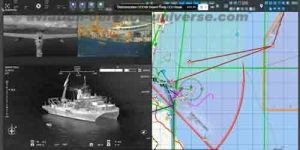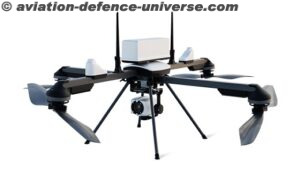
Paris. 06 October 2021. The maritime patrol version of Safran’s Patroller drone has shown its ability to meet the maritime surveillance needs of navies or European maritime surveillance agencies, as part of the European project OCEAN2020. This project is funded by the European Commission within the scope of the European Defense Agency’s preparatory defense research action contract (PADR: Action Préparatoire de Recherche de Défense). The project entailed naval exercises organized in the Baltic Sea at the end of August, bringing together 18 partners, including five navies, for the final OCEAN2020 demonstration. It was designed to show that the combined use of drones operating in different maritime environments (air, surface, underwater) would give command centers a better grasp of the tactical situation.
The Patroller drone showed its interoperability during the demonstration, including the real-time transmission of data from its sensors (radar tactical situation, multispectral videos) to the tactical operations center (at a Swedish army test center in Ravlunda) and to the Maritime Operations Center (MOC) control center in Brussels at European Defense Agency premises.
Developed and produced in France by Safran Electronics & Defense, the Patroller features a modular architecture that allows it to carry a high-performance multi-sensor intelligence payload, adaptable to all types of missions. For the OCEAN2020 demonstration, Safran Electronics & Defense outfitted the Patroller with the Osprey multimode radar from Leonardo and its own Euroflir™410 optronic (electro-optical) system.
The drone was deployed from Kristianstad airport in southern Sweden, and participated in the two naval scenarios organized as part of the OCEAN2020 demonstration. The first scenario concerned underwater operations, while the second focused on surface exercises involving several ships in different stages of engagement. Because of its dispatch reliability and excellent sensors, the Patroller made a significant contribution to the demonstration by covering all phases in the surface scenario. It was able to capitalize on the different features of its multi-sensor payload to detect and track, at long range, high-speed combat ships, thanks to its radar, and then identify them using its optronic sensors. The Patroller also provided high-resolution observation of various actions, including convoy attack scenarios and the boarding of a suspect vessel by Lithuanian special forces.
Throughout the program in Sweden, encompassing preliminary tests, rehearsals and demonstrations, the Patroller carried out a total of 19 flights in its dual maritime radar/optronics configuration over the Baltic Sea. Its performance in these tests, coupled with tests in Finland using the tactical drone system version, clearly proved its versatility.































































































































